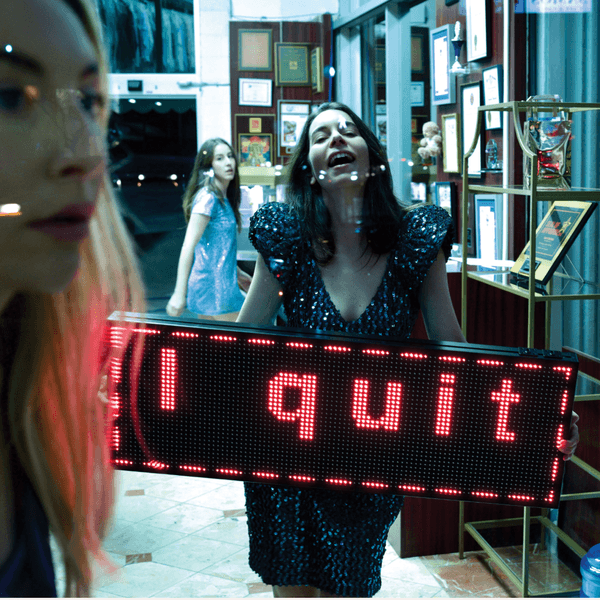
TLOBF Interview // Tracey Thorn
Tracey Thorn has an instantly recognizable voice, often emanating like smooth honey out of the speakers. She’s been an influential member of the English music scene for three decades now, continually reinventing herself and the direction of British music in the process. Thorn has just released her third solo album, Love And Its Opposite, which is a lovely collection of ruminative, penetrating numbers that echo the stark, acoustic based songs which launched her stellar career. We were truly fortunate to get to ask Thorn a few questions about her current writing process, how her intriguing collaborations come about, and why she’s so fond of Twitter these days. Her answers ultimately prove to be as insightful as her songs.
Were the stark, acoustic arrangements used on Love And Its Opposite intentionally meant to augment your honest, unvarnished appraisals of middle age? Or was it more of a conscious effort on your behalf to return to your more austere songwriting origins?
TT: Initially I started out with the plan of wanting to make a very stripped-down record, much more of a genuinely “solo” record than Out Of The Woods had been. I was also aware that when I record non-electronic tracks, I have to be very careful to maintain a sense of tension and not let things get too relaxed or soft around the edges. The best way to guarantee that is to keep things minimal. Once I started writing the songs, and the lyrics took on the angle they did, I realised even more that to leave things unadorned would create a very emotionally powerful record.
Do you have to do anything differently to carve out time for songwriting these days with your kids growing older, or is it just a matter of paying close attention to what is happening around you and using that for inspiration?
TT: There is no real lack of inspiration in that there are always dramas happening everywhere that can be the starting point for a song – the difficulty is carving out enough mental space to be able to write about them in a clear-headed way. I need to have time to be able to think myself back into an adult world-view before I can even think about writing.
The subjects of your new songs are often quite lonely and searching for fulfillment in their lives. Are these tracks subtle expressions of thankfulness on your behalf that your life didn’t turn out that way?
TT: Well I’d hate that to come across as smug in any way – I mean, my life may not be the same as, for instance, the female character’s in “Singles Bar” but I’m very aware that it could easily be me, and I think I’m trying to explore what that would feel like. I certainly don’t mean to imply that it sounds like an APPALLING situation! There is certainly loneliness involved, and a somewhat fearful sense of not finding what is being looked for – but then, at the same time, this woman is also having fun, I think, and just indulging herself.
You have some impressive guests on this record (Jens Lekman, Al Doyle, Leo Taylor and Cortney Tidwell, to name a few). Do you envision these specific contributions filling in parts that you feel are missing in your songs, or is it just a matter of asking your friends to help out on certain songs? And how did your lovely duet with Jens Lekman originate?
TT: No I didn’t have specific parts in mind when I collaborated with these people – Al and Leo came in to work as a rhythm section on a few songs, and because they had been playing together live in Hot Chip they had a very strong connection with each other, and created a vibe as soon as they started playing together. With Cortney, I just sent her my recording of “Swimming” and she sent it back with drums and vocals all over it, none of it what I expected but I thought it sounded fantastic! And Jens I had worked with once already, when we did a cover of “Yeah Oh Yeah” for the Merge compilation. He is living in Australia at the moment so again, we recorded the track at long distance from each other – he went into a studio and did his vocal part and then just sent it to me.
How does your obvious comfort level with producer Ewan Pearson affect the ease of the recording process for you, and how was making the new record different from recording Out Of The Woods?
TT: I find working with Ewan incredibly easy – he is very relaxed (though he would deny that and claim that he is a bundle of nerves, but luckily he hides it most of the time) and also very supportive, so when I play him a song for the first time he makes it quite clear if he thinks it is a GREAT song, and that is very encouraging for a sensitive singer-songwriter type like myself.Making this record was completely different from the last one – last time round there were lots of collaborations, and tracks where I simply added a song to an already-created backing track. This time around, each track began with me and Ewan sitting in a room, with nothing at all recorded, going, “Right, what first?” For me, it was a more hands-on approach.
You are an admittedly avid gardener. Do you find a lot of similarities between gardening and songwriting-like nurturing a song along the way so that it flourishes, while also pruning away any unneeded excess? And how does your love of one affect the other?
TT: No, not really – songwriting is an entirely mental process, whereas gardening is quite physical and that’s why I like it. There isn’t much thinking involved, just getting on with it, lots of DOING.
You are very active with social media (Twitter, Facebook, etc…). Do you find the immediacy of that type of interaction appealing? And how do you think properly harnessing that style of discourse and interaction can benefit a musician?
TT: I like the interaction, yes, because I am basically quite a chatty person, I like the sense of conversation you get from Twitter, and I like the fact that people can comment directly at you on Facebook. I used to fee l a bit isolated from the audience before, but I’m beginning to feel I know them better now and they are real people. Obviously it can all be very beneficial in terms of reaching out to the people who like what you do – especially if those people are somewhat outside the mainstream of music buying, perhaps because their tastes are a bit left-field, or perhaps because they are older and have stopped buying the music press and hanging out at gigs etc.
Get the Best Fit take on the week in music direct to your inbox every Friday

Loyle Carner
hopefully !

Yaya Bey
do it afraid

Haim
I quit





